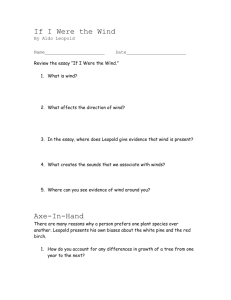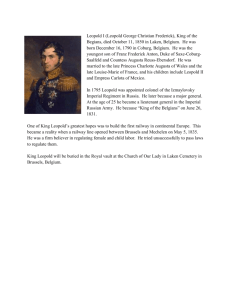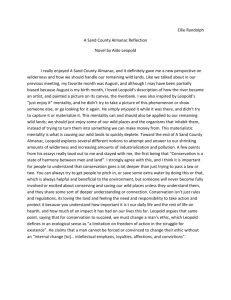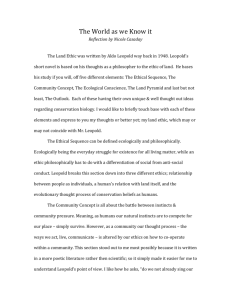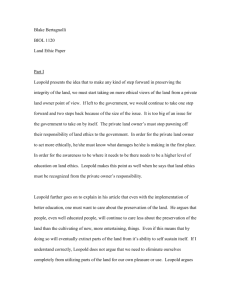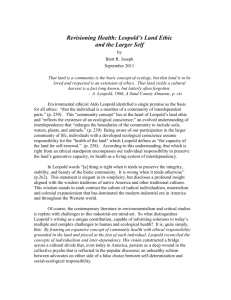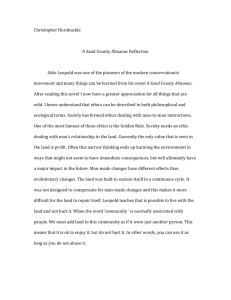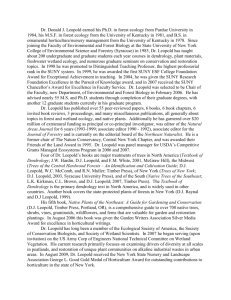Christian Faith and Environmental Ethics: Aldo Leopold`s Sand
advertisement
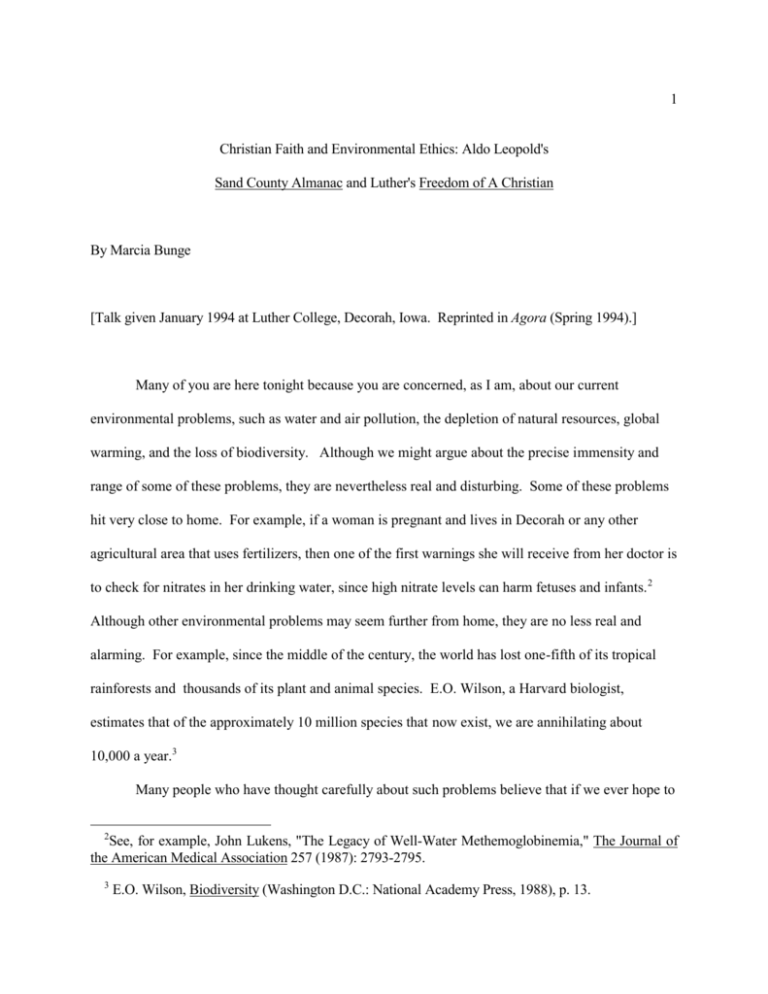
1 Christian Faith and Environmental Ethics: Aldo Leopold's Sand County Almanac and Luther's Freedom of A Christian By Marcia Bunge [Talk given January 1994 at Luther College, Decorah, Iowa. Reprinted in Agora (Spring 1994).] Many of you are here tonight because you are concerned, as I am, about our current environmental problems, such as water and air pollution, the depletion of natural resources, global warming, and the loss of biodiversity. Although we might argue about the precise immensity and range of some of these problems, they are nevertheless real and disturbing. Some of these problems hit very close to home. For example, if a woman is pregnant and lives in Decorah or any other agricultural area that uses fertilizers, then one of the first warnings she will receive from her doctor is to check for nitrates in her drinking water, since high nitrate levels can harm fetuses and infants. 2 Although other environmental problems may seem further from home, they are no less real and alarming. For example, since the middle of the century, the world has lost one-fifth of its tropical rainforests and thousands of its plant and animal species. E.O. Wilson, a Harvard biologist, estimates that of the approximately 10 million species that now exist, we are annihilating about 10,000 a year.3 Many people who have thought carefully about such problems believe that if we ever hope to 2 See, for example, John Lukens, "The Legacy of Well-Water Methemoglobinemia," The Journal of the American Medical Association 257 (1987): 2793-2795. 3 E.O. Wilson, Biodiversity (Washington D.C.: National Academy Press, 1988), p. 13. 2 solve them effectively, then we need a strong environmental ethic. In other words, we need a clear understanding of our relation to the earth and our responsibilities to it. In addition, some ethicists claim that an environmental ethic, however brilliantly proposed, will have little meaning and certainly not be lived out unless it arises from and is supported by an attitude of respect for nature. By respect for nature ethicists mean more than just a friendly tipping of the hat to nature, more than enjoying nature programs on television or taking the occasional hike. Most environmental ethicists define respect for nature in a much deeper sense to mean that we believe each part of nature has worth and is deserving of moral concern. Respect for nature is an attitude that recognizes all parts of nature have value independent from human interests. Although respect for nature does not necessarily mean that we value each part of nature equally, it does provide a starting point for acknowledging that we have some moral obligations to nature and that we should act in ways that protect and preserve it. Those who believe respect for nature is a fundamental presupposition for an environmental ethic and for solving our environmental problems today are naturally asking: How can we promote this new attitude of respect? Some have suggested that we need new myths to shape an attitude of respect for nature. Others believe that an understanding of ecology is the best hope for promoting this respect. Still others look to various religions for help. These concerns have also generated a lively debate about whether or not Christianity promotes respect for nature and can help solve our environmental problems. On the one hand, there are those (Christians and non-Christians alike) who say that Christianity provides little support, if any, for an environmental ethic. They claim Christianity has ignored our relation to the earth and perhaps even contributed in significant ways to our present environmental problems. Some scholars, such as Lynn White, argue that Christianity has taught that human beings "have dominion" over the 3 earth, thereby instilling the attitude that human beings transcend nature and can treat it in whatever way they please. White believes this attitude has shaped the development of modern Western technology and concludes that Christianity "bears a huge burden of guilt" for our ecological crisis.4 On the other hand, there are those who say that Christianity can provide the foundation for an environmental ethic. This claim is made not only by Christians but also by people outside the church. Even natural scientists who have no affiliation to the church are coming to Christian theologians for help in solving our environmental problems. I recently attended a conference in Washington D.C. hosted by the renowned astrophysisist, Carl Sagan. Sagan has no affiliation to a church, and he usually describes himself as an atheist, yet he invited both scientists and theologians to the conference in order to help establish a dialogue between them. He believes such a dialogue is crucial because he thinks that hearing facts about environmental problems does not change people's behavior. People will only live more responsibly in relation to the natural world if their core beliefs and moral attitudes compell them to do so. Sagan and other scientists hope that basic Christian beliefs might be able to foster the kind of respect for nature that will lead to more responsible ways of living in it. Although Christianity has in some ways contributed to environmental problems, I believe that it can play an important role in solving them. More specifically, I propose that many central Christian beliefs foster respect for nature and therefore provide a strong basis for an environmental ethic. Tonight I want to support this thesis by examining two central Christian doctrines that foster respect for nature. There are other Christian doctrines that foster this respect, but I have chosen the most obvious one and the least obvious one to make my case tonight. 4 Lynn White, Jr., "The Historical Roots of Our Ecologic Crisis," Science 155 (March 10, 1967): 1203. Lynn White, a Christian, does, however, find a helpful resource in the ideas of St. Francis. 4 The doctrine which most obviously fosters the care and respect for nature is the doctrine of creation. The doctrine which perhaps least obviously fosters this repect is the Doctrine of Justification, a doctrine which outlines a view of salvation that is central to many protestant churches today. A common charge is that the Christian view of salvation, especially in its Protestant form, takes away from a concern for and involvement in the natural world. It puts such an emphasis on the next world that it directs our attention from this one, such an emphasis on the relation between God and human beings that it leaves no room for our relation to other living things. This charge is common not only among secular ethicists but also among some Christian theologians. For example, Thomas Berry, a popular theologian who has written on environmental issues, claims that an emphasis on redemption and the Word has oriented believers away from the natural world. He suggests that we "diminish an emphasis on redemption experience in favor of a greater emphasis on creation processes."5 Sallie McFague, a theologian who aims to imagine a relation between God and the world that addesses the environmental concerns we face today, believes that a theology of nature relevant to the late 20th century must be "creation-centered, in contrast to the almost total concern with redemption in some Christian theologies." 6 Even Paul Santmire, a Lutheran theologian, says that the focus on human salvation and the relation between God and human beings has left the Protestant tradition with a weak view of creation. He suggests that we turn attention away from salvation and focus on another aspect of Protestant thought: the authority of scripture. He believes the scriptures contain a positive view of the natural world that can "heal" the 5 Thomas Berry, The Dream of the Earth (San Francisco: Sierra Club Books, 1988) p.81. See also pp. 87, 122, 126. 6 Sallie McFague, "Imaging a Theology of Nature: The World as God's Body," Liberating Life: Contemporary Approaches to Ecological Theology, edited by Charles Birch, William Eakin, and Jay B. McDaniel (Maryknoll, New York: Orbis Books, 1990), p.203. 5 Protestant mind from its focus on sin and salvation.7 In contrast to these theologians, I believe that if we look more carefully at the doctrine of justification, we will find that instead of placing an obstacle in front of efforts to solve our environmental problems, this view of salvation can provide a foundation for treating the earth more responsibly. My lecture has two parts. First, I will examine a seminal text in the area of environmental ethics: Aldo Leopold's Sand County Almanac. In this text, Leopold, discusses why we need an environmental ethic and what it entails. He also illustrates why respect for nature is an essential presupposition for any environmental ethic. Our discussion of Leopold prepares the ground for showing, in Part II, in what ways the doctrine of creation and doctrine of justification foster respect for nature and provide foundations for a strong environmental ethic. In this part of the lecture I will refer to the Bible, the most seminal text of Christianity, and to Martin Luther's " The Freedom of a Christian," a classic text of Protestant thought. I will conclude my remarks by outlining some implications of my findings for the church and for this college. Aldo Leopold is a somewhat unlikely candidate for such fame in the field of environmental ethics.8 He loved hunting and fishing, and his actual professional training was in forestry, not philosophy. He was born in Iowa in 1887, earned a degree at Yale University in the School of 7 H. Paul Santmire, "Healing the Protestant Mind: Beyond the Theology of Human Dominion," After Nature's Revolt: Eco-Justice and Theology, edited by Dieter Hessel (Minneapolis: Fortress, 1992). 8 For a brief introduction to Leopold's life and thought see Susan L. Flader, Thinking Like a Mountain: Aldo Leopold and the Evolution of an Ecological Attitude Toward Deer, Wolves, and Forests (Columbia, Missouri: University of Missouri Press, 1974), pp. 1-35; and the "Preface" and "Introduction" to Aldo Leopold, The River of the Mother of God, edited by Susan Flader and J. Baird Callicott (Madison, WI: University of Wisonconsin Press, 1991), pp. ix-31. For a comprehensive biography of Leopold see Curt Meine, Aldo Leopold: His Life and Work (Madison, WI: University of Wisconsin Press, 1988). 6 Forestry, worked several years for the U.S. Forestry Service, and later became the country's first professor of Wildlife Management at the University of Wisconsin in Madison. During his early years in the Forestry Service, he was concerned about maximizing game populations and recreational lands for hunters. Yet as he gained more field experience, and as the science of ecology itself matured, Leopold began to develop more of an ecological perspective towards nature and our place in it. His perspective also deepened, in part, through his observations of nature at an old farm located on the Wisconsin River in Sauk County, Wisconsin (which Leopold called Sand County). Leopold bought the farm in 1935 and worked to restore it to its ecological integrity. There was an old shack on the farm which became his family's weekend retreat. As he grew to appreciate the complexity and beauty of ecological systems, Leopold began to establish more ecologically informed foundations for wildlife management and even for farming. He also worked with many organizations to advocate wilderness preservation, and he began to formulate an environmental ethic. Leopold's multifaceted contributions have made him a central figure in the areas of wilderness preservation, wildlife management, and sustainable agriculture. Signs of his continued impact in these areas are that the University of Wisconsin has endowed a chair of Wildlife Management in Leopold's name, and Iowa's Center for Sustainable Agriculture is called the Leopold Center. Leopold has also become an important thinker in the field of environmental ethics, and this area of his thought is my focus tonight. Leopold's understanding of our obligations to nature can be found in his book, A Sand County Almanac, which is a collection of observations of nature and philosophical essays. These essays were composed during the last ten years of his life, many of them at his farm in Sauk County, and were published posthumously in 1949. A Sand County Almanac is one of the most frequently read works in conservation, along with works by Henry David Thoreau and John Muir. One 7 commentator observes that A Sand County Almanac is "almost a holy book in conservation circles." 9 A Sand County Almanac also includes the essay, "A Land Ethic," which outlines Leopold's ideas about a new ethical relation to nature. This essay is considered a seminal text in environmental ethics and is found in almost every anthology of Environmental Ethics today. It is seminal because it is one of the first texts to call for a comprehensive ethic that enlarges the boundaries of ethical concern to include not only human beings but also other animals, and even plants, soil, water, and air. Since "the Land Ethic" expresses Leopold's mature ethical ideas most directly, I will focus on its major components. Two of the central terms in the essay are "land" and "biotic community," terms which Leopold defines broadly. He does not use the term "land" to simply mean a geographic location, an acreage with trees or fields, or even the underlying soils. Rather, Leopold speaks about the "land" as a "biotic community," using the word "land" in a broad sense to mean "soils, waters, plants, and animals" as well as the circuit of energy flowing between them. 10 Thus, Leopold appears to use "land" and "biotic community" as synonyms. Today, we usually use the term biotic community in a different sense to refer only to living organisms and their interactions. However, since Leopold includes the soils and waters in his definition of "land" and "biotic community", he can be understood to be referring to what contemporary ecologists call an ecosystem.11 An ecosystem is 9 J. Baird Callicott, In Defense of the Land Ethic: Essays in Environmental Philosophy (Albany, New York: State University of New York Press, 1989), 75. 10 Aldo Leopold, A Sand County Almanac: With Essays on Conservation from Round River (New York: Ballantine, 1966), p. 239 & 253. 11 James Heffernan, "The Land Ethic: A Critical Appraisal," Environmental Ethics: Divergence and Convergence, edited by Susan J. Armstrong and Richard G. Botzler, (New York: McGraw-Hill, 1993), p. 399. The term "ecosystem" was coined by Arthur Tansley, A British plant ecologist, in 1935. 8 basically a "community of different species interacting with one another and with the chemical and physical factors making up its non-living environment."12 Boundaries of ecosystems are rarely clearly defined, but the term is generally used to refer to communities such as forests, prairies, wetlands, or deserts. Leopold claims that all parts of the biotic community are interrelated in a complex web of relationships. He describes the relationships between the members of a "biotic community", or an ecosystem, by using the image of a "biotic pyramid." 13 This image summarizes his understanding of some basic concepts of ecology. Layers in this pyramid represent different species which are grouped together on the basis of how they procure their food or energy. The pyramid describes the circuit of energy that passes from one organism to another. According to Leopold, at the bottom of the pyramid is the soil. Plants absorb minerals from the soil and capture energy from the sun and thereby compose the next layer in the pyramid. The energy captured in the plants courses though plant-eating animals and then to omnivores and carnivores. Human beings share a level in the pyramid with other omnivores such as bears, raccoons, and squirrels. Leopold says that the chains of dependency in the pyramid are complex because each species can be a link in several food chains. Leopold claims that we have neglected to see these lines of dependency represented in the pyramid and have failed to understand the complex relationships of ecosystems. Our ignorance has created many environmental problems, for we tend to make changes in one part of an ecosystem that affect other parts in unpredictable ways. Although through evolution some changes do naturally occur, these changes are usually slow, and species are able to adapt to them. The changes human 12 "Glossary," G. Tyler Miller, Jr., Living in the Environment, 7th edition (Belmont, CA: Wadsworth, 1992). 13 Leopold, Sand County, 251-258. 9 beings make are often of a larger magnitude than evolutionary changes and "have effects more comprehensive than is intended or foreseen."14 An ecosystem can sometimes recover from these changes but at a reduced level of complexity and with a reduced carrying capacity. Throughout Sand County Almanac Leopold points out several ways human beings have ignored the complexity of ecosystems, creating unintended environmental problems. For example, poor agricultural practices have led to loss of soil and a decrease in soil fertility. The building of roads has fragmented habitats, causing the extinction of some species. Game management practices, which grant competitive advantage to one species that we find "useful," threaten the population of other species and eventually even the population of the species we attempt to benefit. For example, Leopold often speaks of the problems created by attempting to maximize the deer population by killing wolves, a common policy in Leopold's time which he himself supported early in his career. He came to see that as the herd grows unchecked by their natural predators, their food supply becomes scarce. Eventually, the little remaining vegetation is entirely depleted, resulting in the mass starvation of entire herds. Other species who depended on that vegetation also suffer, and the structure of the remaining plant community is drastically altered. Even if an unnaturally high deer population is able to be fed by gamekeeper programs, as in Germany, such a high population of deer leads to an "unnatural simplicity and monotony in the vegetation of the forest floor"15 and to degraded soils. Thus, for the sake of maintaining an unnaturally large deer herd, we sacrifice not only the welfare of the herd but also the diversity of the forest itself. 16 14 Leopold, Sand County, 255. 15 Leopold, The River of the Mother of God, 11. 16 Curt Meine, Aldo Leopold, 498. 10 Leopold says that those whose eyes are ecologically trained to recognize such environmental problems live in a "world of wounds."17 Leopold's list of such wounds in A Sand County Almanac is extensive. Yet if he were here today, he would surely be adding to it. Since his death in 1948, scientists have helped our eyes see more clearly than ever before the wounds that Leopold describes, and they have alerted us to other wounds that have become more visible in our own time, such as habitat fragmentation, rapid loss of biodiversity, groundwater contamination, ozone depletion, and global warming. Leopold believes that such environmental harm is not the result of ecological ignorance alone. Such environmental degradation also occurs because we have a fundamentally false conception of the "land" and our relationship to it. Leopold claims that we view the "land" as a mere commodity, valuing it only in economic terms. Furthermore, we see ourselves as conquerors or masters of the land instead of "plain members and citizens" of it. We see ourselves as somehow above or apart from the natural processes on which we depend. Thus, our decisions about land use are driven mainly by economic self-interest. Decisions dictated by economic self-interest are bound to lead to environmental problems because some parts of an ecosystem have no commercial value and yet they are essential to the persistence, health, function, and beauty of an ecosystem. Leopold claims that since our decisions about land-use are dictated by economic self-interest, ecological education alone cannot solve our environmental problems. Furthermore, since the problems are so wide-spread they can also not be solved simply by government regulation. Governments could not possibly monitor and enforce all of the actions that contribute to environmental degradation. 17 Leopold, Sand County, 197. 11 Leopold believes, therefore, that in addition to educating ourselves about ecology, we need a "Land Ethic": we need an understanding of our obligations to the land. Leopold realizes that his call for a Land Ethic radically extends the boundaries of ethical obligation. However, he believes that the history of ethics shows us that the scope of our ethical concern can and does expand. He claims that human beings initially recognized obligations only to other individuals, but gradually they developed a sense of moral obligation to society.18 Leopold recognizes, however, that our sense of obligation does not yet extend beyond the human community. By calling for a Land Ethic, Leopold wants us to recognize ethical obligations to entire ecosystems and thus to animals and plants and even to soils, water and air. Leopold believes, however, that such a comprehensive ethic will never be carried out without a fundamental change in our values, attitudes, and beliefs. No important change in ethics was ever accomplished without an internal change in our intellectual emphasis, loyalties, affections, and convictions. 19 More specifically, Leopold claims that a necessary presupposition for the development of a land ethic is love and respect for the land. It is inconceivable to me that an ethical relationship to land can exist without love, respect, and admiration for land and a high regard for its value. By value, I of course mean something far broader than mere economic value; I mean value in the philosophical sense. 20 By "value in the philosophical sense," Leopold is speaking about "inherent value" or "intrinsic 18 Some philosophers confirm Leopold's claim that the scope of ethical concern is expanding by pointing to the recent expansion of rights to particular groups, such as women and African Americans. Callicott, In Defense, 77. 19 Leopold, Sand County, 246. See also p. 263. 20 Leopold, p.261. 12 worth." For Leopold, land has value in and of itself, apart from its benefit for the well-being of human beings, apart from its economic value. Leopold extends respect and deep regard to every individual member of the community as well as to the biotic community per se. In short, a land ethic changes the role of Homo sapiens from conqueror of the land-community to plain member and citizen of it. It implies respect for his fellow-members and also respect for the community as such.21 Many of the descriptions of nature in other essays in A Sand County Almanac foster the kind of respect for nature that Leopold believes is necessary. These descriptions, in a sense, prepare the reader for his discussion of our obligation to the land. Leopold's own ethical principle that extends to the biotic community is: "A thing is right when it tends to preserve the integrity, stability, and beauty of the biotic community. It is wrong when it tends otherwise."22 When Leopold speaks of preserving the "integrity, stability, and beauty of the biotic community" he is referring to preserving the characteristic structure, function, and diversity of an ecosystem.23 Certainly no ecosytem is stable relative to all possible disturbances. Ecologists would have a difficult time defining a stable ecosystem since ecosystems are by nature dynamic. However, some actions can radically alter the characteristic structure or functional processes of an ecosystem, such as eliminating important species with pesticides, introducing exotic species, destroying habitat, or dumping wastes into fresh water. Other actions, such as ozone 21 22 23 Leopold, Sand County, 240. Leopold, Sand County, 262. Thus, some current literature has rephrased Leopold's principle as follows: "A thing is right when it preserves the characteristic diversity and stability of an ecosystem (or the biosphere). It is wrong when it tends otherwise." Heffernan, p. 404. 13 depletion, can threaten several ecosystems. Leopold's principle would argue such actions are wrong. He admits that as human beings we cannot prevent the alteration or use of some resources. Nevertheless, a land ethic sets limits on this alteration and affirms that all parts of the biotic community have a right to their continued existence. Leopold's Land Ethic has stirred much debate. For example, some critics argue that the Land Ethic is misanthropic because they think it could condone the destruction of individual human lives in the interest of the biotic community. Yet most interpreters of Leopold believe that his ethic does not override or replace previously established moral sensibilites or obligations to human beings. Rather, the Land Ethic is understood to be "an additional rule to a primary duty to human beings." 24 Philosophers also debate whether Leopold's position accords rights to ecosystems or only to human beings. Despite these various interpretations, ethicists recognize that Leopold played a central role in the development of environmental ethics by pointing out the complexity of ecosystems, by taking the ecological consequences of our actions seriously, and by challenging us to outline our moral obligations to nature. Furthermore, he emphasized that respect for nature is an important presupposition for any sound environmental ethic. Even ethicists who do not agree with Leopold's own land ethic recognize that ethical norms will only make sense and be carried out if they are consistent with a person's underlying moral attitudes, which are grounded in particular beliefs about 24 Armstrong and Botzler, p. 371. For example, Heffernan claims the land ethic is "an additional prima facie rule of conduct rather than a single new standard of right and wrong"; Heffernan, p. 404. Ethicists who support Leopold's Land Ethic are aware that it can on occasion conflict with other ethical principles, and they have tired to put forth principles to deal with such conflicts. Jamer Heffernan, for example, suggests the following principle: "the survival interets of human beings ought to outweigh those of the rest of the biotic comunity and the survival interests of the rest of the biotic community ought to outweigh the nonsurvival interests of human beings"; Heffernan, p. 404. 14 the world.25 Many ethicists since Leopold have recognized that any comprehensive environmental ethic must be grounded in an attitude of respect for nature, which recognizes that parts of nature have value apart from their benefit to human beings and are worthy of moral concern. With this discussion of Leopold's Land Ethic, we now turn, in Part II, to the question: Does the Christian faith promote the kind of respect for nature that Leopold and others believe is necessary for developing a sound environmental ethic? Does the Christian faith provide any compelling grounds for taking environmental problems seriously and living in ways that help solve them? One dimension of the Christain faith that clearly promotes respect for nature is the Christian doctrine of creation. The doctrine of creation emphasizes, first of all, that God is the source of all life. God is the source from which all reality flows and on which everything depends. This is what Christians confess in the Apostle's Creed when they say that God is the "maker of heaven and earth." (By the way, this confession in no way should be equated with belief in creationism, a particular literal interpretation of the Bible that is opposed to Evolution. Most theologians of mainline churches believe the confession that God is creator is compatible with the theory of evolution.) The doctrine of creation also emphasizes that creation is good. This has been a central belief from the beginning of Judaism and Christianity. There are many passages in the Bible that speak of this goodness. The first chapter of Genesis, for example, states that God made all things and saw that each part of creation is good. No Christian theologian would disagree with these two aspects of the doctrine of creation. 25 Paul Taylor has convincingly outlined relationships between beliefs, moral attitudes, and ethical norms. He also defines respect for nature in a particular way. See Respect for Nature: A Theory of Environmental Ethics (Princeton, NJ: Princeton Universtiy Press, 1986). 15 Yet theologians have not always emphasized the implications of these central beliefs for our understanding of the earth and our obligations to it. Both of these common aspects of the doctrine of creation imply that Christians are to respect the earth in the sense that they are to recognize that nature has value apart from its instrumental value to human beings and is worthy of moral concern. If God is the source of all life, and if human beings are neither creators nor owners of the earth, then they should respect God's earth. In addition, since God is the source of all life, all creatures share a common relationship, and we should therefore respect them. Furthermore, if creation is good and God saw that is was good, then those who believe in God should also recognize its goodness and respect all that God has created. Respect for God's creation would, therefore, include respect for all living organisms as well as their habitats and the functional processes that link them together. Another aspect of the Christian doctrine of creation that is more often neglected but which also provides grounds for respect for the earth is the biblical view that creation is diverse and that God takes pleasure in this diversity. Passage after passage in Genesis, Job, and the Psalms emphasize the diversity of creation and God's pleasure and delight in the many diverse forms of life on this planet. For example, Genesis 1 states that God made the water and the land; the plants, with seed in their several kinds, and trees with seed in their several kinds. God made "swarms" of living creatures in the water and every kind of winged creatures. God made these creatures in their tremendous diversity and saw that they were good.26 God pronounces their goodness before and apart from the creation of human beings. Incidentally, in a brief article on conservation, Leopold also points out that God takes pleasure in the diverse forms of life on this planet apart from their relation to human beings. 26 See also, for example, Psalm 148. 16 Leopold did not profess an adherence to any organized religion, but he did apparently enjoy reading the Bible, especially the prophets and Job, and he alludes to them in some of his writings because he felt they sensed an appreciation of and ethical obligation to the land. He even calls Job the "John Muir of Judah." In this brief article he says that species existed millions of years before human beings ever entered the scene, and it is just possible "that God likes to hear birds sing and see flowers grow."27 God's pleasure in diversity is also expressed at the end of the story of Noah and the flood. The text says God told Noah to let all of the creatures "swarm on the earth"; let them "be fruitful and multiply on the earth" (Genesis 8:17). The New Revised Standard translation is let all the creatures "abound on the earth and be fruitful and multiply." 28 This aspect of the Christian view of creation also provides grounds for respect for nature. If creation is diverse and God treasures this diversity, and if God wills all forms of life to flourish, then those who believe in God should value this diversity apart from its usefulness to human beings, find pleasure in it, and allow it to flourish. The last aspect of the Christian doctrine of creation that I will discuss tonight which complements the first three is that human beings are to care for the earth. This insight into the doctrine of creation can be found is in Genesis. When Adam and Eve are placed in the Garden of Eden, for example, they are told to "till it and keep it" or "to cultivate and take care of it" (Genesis 2:15). Genesis 1:28 also speaks of the human being's relation to the earth. This passage states that God said to Adam and Eve, "Be fruitful and multiply, and fill the earth and subdue it; and have 27 28 Leopold, The River of the Mother of God, p. 96. See also Genesis 1:22. 17 dominion over the fish of the sea and over the birds of the air and over every living thing that moves upon the earth." "Have dominion" (in the Hebrew rdh) is often, mistakenly, understood to mean dominate, and the passage is interpreted to mean that human beings have "absolute control" over other living things; they can treat them in any way that they please. However, the Hebrew notion of "dominion" has a much different meaning. Loosely translated, the word means "to walk proudly" or "tread," and generally the word is used to describe the rule of a king over his people. As Jim Limburg, an Old Testament scholar, has shown, the Old Testament emphasizes that a king is to rule responsibly, to have pity on the weak and the poor, and to save those in need. To have dominion, then, can be interpreted to mean not ruling tyrannically or selfishly but rather responsibly and with justice. Limburg points out that the story of Noah supports such as interpretation of "dominion" for in this story "having dominion" over creatures means to rescue them, to nurture them, and to set them free to roam on the earth. 29 Other theologians also interpret the meaning of dominion in the light of Jesus who provided a new model of dominion as love and service to others. We have examined just four aspects of the doctrine of creation (and there are others that we could explore). All of these aspects imply that human beings are to respect and care for the earth. As such, the doctrine of creation provides a strong foundation for an environmental ethic. Those who believe in God as creator are called to treat the earth with respect and integrity and to live in harmony with it. I now want to turn to a second ground for environmental responsibility: the view of salvation which is expressed in the Doctrine of Justification. Most of you are probably familiar with the main 29 James Limburg, "The Responsibility of Royalty," Word and World 11 (1991): 128. 18 point of this doctrine, even if not all of you would call it the doctrine of justification. Justification means simply "being made acceptable before God" or "being seen as righteous before God." The doctrine of justification emphasizes that God is a gracious, loving God who accepts and justifies believers, not on the basis of what they do but by God's grace and through faith in Christ. This doctrine was outlined by Martin Luther in the 16th century. It is the central doctrine of Lutheran theology still today and plays a significant role in many other Protestant traditions. Luther's articulation of this doctrine emerged amidst his own spiritual struggle. After studying law, Luther entered the Augustinian monastery in Erfurt and became a monk and eventually a priest. 30 As a monk, Luther attempted to live a life of holiness, trying to earn God's favor by doing good deeds, such as praying, fasting, and confessing his sins, sometimes up to six hours a day. Luther's efforts were consistent with a common view of salvation in his own time, the nominalist view, which emphasized that one can earn God's grace by trying to do good deeds or by "doing one's best." 31 This little phrase tormented Luther because he never knew how much he must do to please God. Eventually, Luther began to hate God, whom he perceived more and more as a harsh judge. Amidst this spiritual struggle, Luther went to Wittenberg, where he became a professor of Bible. While lecturing on the Psals and the book of Romans, Luther discovered a new interpretation of salvation. He came to see that forgiveness and salvation is a gift, not something to be earned. One is saved not 30 Two accessible and informative biographies of Luther are: Roland Bainton, Here I Stand: A Life of Martin Luther (Nashville, TN: Parthenon Press, 1950); and James M. Kittelson, Luther: The Reformer (Minneapolis, MN: Augsburg Publishing House, 1986). 31 The nominalists did believe that if you do your best (the Latin phrase is "facere quod in se est literally "do what is in you"), then God will grant you grace. Empowered by grace one can do works that are wholly worthy and thereby earn eternal life. For an excellent summary of the nominalist position, see Brian Gerrish, Grace and Reason: A Study in the Theology of Luther (Chicago, IL: University of Chicago Press, 1979). 19 by doing good deeds, but by having faith alone in Jesus Christ. This insight brought Luther much comfort because he now viewed God as a loving and gracious God instead of a harsh judge. This view of salvation also helped spark the Reformation, changing the religious and political map of Europe. Although the doctrine of justification emphasizes that salvation is by faith alone, we need to study some of its other features if we want to understand more clearly what Luther says about salvation and faith. We can do so by examining his text, "The Freedom of a Christian" (Freiheit eines Christen Menschen), a seminal text of Christian thought. Luther himself seemed to regard this text as seminal when he says that "it contains the whole of Christian life in a brief form." 32 In this text Luther says the Bible makes two seemingly contradictory claims: a Christian is "a perfectly free lord of all, subject to none" and at the same time a Christian is a "perfectly dutiful servant, subject to all."33 Luther explains that a Christian is a free lord subject to none through faith in Christ. For Luther, faith brings freedom from worrying how to be justified before God and trying to earn God's favor. Faith assures one that justification, and therefore salvation, is a free gift of God, for faith alone justifies and saves. A Christian is therefore subject to no one and is freed from trying to do all kinds of actions to earn God's favor. For Luther, this new freedom brings great joy and a new confidence. It gives one's life a new foundation. Luther expresses this newness of life in radical terms when he says that faith brings the "death of the old self" and the "life of the new." By claiming that faith brings death of the "old self," Luther means that faith brings death to distorted and destructive views of oneself. In Luther's own 32 Martin Luther, Martin Luther: Selections from his Writings, edited by John Dillenberger (New York: Anchor Books, 1961), p. 52. 33 Ibid, p. 53. 20 writings he points out the destructive tendency human beings have to be self-serving -- to make themselves so central that they cannot see the needs of others. Today we might discuss equally destructive views of the self, such as lack of self-confidence. According to the doctrine of justification, faith frees the believer from all such distorted views of the self and provides a new foundation, a new self, that finds confidence in God's love and forgiveness. In this sense, a Christian is "a free lord." Yet the doctrine of justification does not end with the claim that a Christian is a "free lord subject to none." Luther adds that a Christian is also a servant, subject to all. He believes that even though one is not justified by good works, such as helping the poor and needy, one does good works "freely" and "joyfully" for the sake of others.34 Good works follow from faith. A familiar way to express this idea is to say that faith is "active" in love. 35 This notion makes sense given Luther's view that faith frees the self from distortions and brings newness of life, confidence, and joy. With this new foundation, one is free to see the needs of others.36 Salvation, then, for Luther, is the assurance of God's forgiveness which not only offers eternal life but also frees one to serve others. If we recognize that Luther's doctrine of justification states not only that faith justifies but also that faith is active in love, then we discover one way this doctrine directly leads to concern about environmental issues. As scientists show us the extent of our environmental problems, it is 34 Luther, p.75. 35 Luther, p.74. 36 Luther clarified the place of works in this text and many others because some of his critics claimed his understanding of faith implied that works are useless or that one can act in any way one pleases and still be saved. Luther believed a Christian does good works but not for reward or to appear pleasing before God but because good works follow from faith. As Luther said, "faith in Christ does not free us from works but from false opinions concerning works"; Luther, p. 81. 21 clear that these problems affect human health and well-being in many ways. Thus, one cannot serve the neighbor without taking into account environmental issues. Love of neighbor and environmental concerns go hand in hand. Let me briefly illustrate this point with some examples. Caring for the sick is certainly understood as one expression of loving the neighbor. Scientific studies have now helped us see that if we want to care for the sick today, then we must take into account environmental problems. For example, several human health problems are being caused by air and water pollution. I saw this very clearly in Leipzig, East Germany, when I taught there four years ago. The air was a dirty gray haze, even on a sunny day, because people used brown coal to heat their homes. Children had numerous respiratory problems and skin disorders and often had to be sent away from the area for weeks at a time. Furthermore, the former government had expanded the strip mines all around Leipzig to such a degree that most of the villages and forests were completely obliterated. The area for miles looked like the surface of the moon and was surrounded by refining factories that created even more air pollution. Christians have also claimed that feeding the hungry is also a work of love. Yet those who are trying to address world hunger today know that it cannot be done without addressing environmental degradation. For example, Gerald Barney,37 Director of the Global 2000 Report to the President, has done extensive research on the relations between hunger, poverty, and environmental problems. He predicts that unless we act quickly to curb population growth, we will soon be unable to provide people with food, clean water, and other basic necessities. He claims the shortage of land resources will lead to social unrest and violence. 37 Barney is a Lutheran who now directs the Millenium Institute that provides updated data of the Global 2000 Report in Global 2000 Revisited (Washington D.C.: Millenium Institute, 1993). 22 Further, Christians have traditionally recognized that working for justice is a work of love. Yet they cannot truly work for justice unless they take environmental issues into account. The issue of justice to future generations arises, for example, when we use nuclear power and build nuclear waste disposal sites. These sites will have to be monitored for thousands of years, forcing future generations to pay unjustly for the waste that we created. The issue of justice to other countries arises any time some countries use more non-renewable resources than others. According to several studies, the United States has only 5% of the world's population yet uses 40% of the world's commercial energy.38 Many recent studies are also documenting connections between environmental problems and injustices against women, minorities and the poor. It is important to acknowledge that this aspect of the doctrine of justification provides an anthropocentric basis for environmental ethics. This is because concern for the environment is based on concern for human beings not on respect for other parts of nature. Concern for other human beings is, by the way, a common starting point for several forms of environmental ethics. 39 Almost all ethical positions presuppose that human beings are to be valued and have moral standing. Therefore, if it is found that particular environmental issues affect the rights or welfare of human beings, then these issues are considered worthy of serious moral deliberation. Luther's doctrine of justification goes one level deeper, however, and provides additional grounds for addressing environmental problems. This can be seen if we examine two further points Luther makes in "Freedom of a Christian" about faith. According to Luther faith also "honors 38 According to Shridath Ramphal, 25% of the world's population uses 80% of the world's commercial energy. Shridath Ramphal, Our Country the Planet (Washington D.C.: Island Press, 1992), 91. 39 One can see this starting point in positions based on Kant's deontology, Bentham's utilitarianism, Mill's utilitarianism, or Rawl's theory of justice. 23 God"; it gives "glory most perfectly to God."40 Luther himself says faith honors God because it sees God as "truthful" and "trustworthy."41 If one also believes, however, that God is the creator of all things, as Luther did and as most Christians do, then it follows that giving glory to God and honoring God involves, at the very least, respecting all of God's creation. Giving glory to God calls for valuing other parts of nature apart from their instrumental value for human beings. Luther also says that faith unites the believer to Christ. 42 Luther himself focuses on the ways in which the believer is united to Christ as king and priest. However, Luther and many other Christians also believe that all things were created through Christ. This dimension of Christ is emphasized in the Gospel of John, which was, by the way, Luther's favorite gospel: "All things came into being through [Christ], and without him not one thing came into being" (John 1:3). All things includes every part of the earth: every part of each ecosystem. Other passages of the New Testament also speak about Christ's role in creation and continued involvement in it. For example, Colossians claims that "in [Christ] all things in heaven and on earth were created"..."all things have been created through him and for him. He himself is before all things, and in him all things hold together" (Colossians 1:15-17).43 If one accepts the testimony of these and other biblical texts and believes that all things were created through Christ and are united in him, then unity with Christ surely means that the believer should value all that exists, including all other species and the 40 Luther, pp. 59, 60. 41 Luther, p. 59. 42 Luther, p. 60. 43 See also the letter to the Hebrews, which states that through Christ God created the world; Christ "bears the stamp of [God's] nature, upholding the universe by his word of power" (Hebrews 1:2-3). 24 integrity of naturally evolved ecosystems. Other texts in the New Testament foster respect for nature by focusing on Christ's redemptive role rather than his creative role. For example, Romans 8 presents a vision of the universal liberation of all the creatures of nature, along with human beings through Christ's death. Colossians 1:19-20 also claims that all things will be reconciled through Christ. Even if theologians disagree about the precise nature of this universal reconciliation, the passages clearly express that God cares for the whole creation and that Christ's redemptive power affects all things. If Christ reconciles all things, then unity in Christ through faith in him means that the believer should respect all aspects of nature. By examining Luther's "Freedom of a Christian," we see that salvation is more than assurance of eternal life. Salvation offers new life in this life through God's forgiveness and through faith in Christ. Faith provides the believer with a new confidence and joy that empowers him or to serve the neighbor, glorify God, and be in union with Christ. All of these aspects of faith inspire respect for nature because one cannot love the neighbor without attending to our relation to the earth, one cannot glorify God without respecting all that God has created, and one cannot be in true unity with Christ without respecting all that has been created through him. Thus, those who say that Christianity's main obstacle to a sound environmental ethic is the emphasis on salvation have only a shallow understanding of salvation. Indeed, rather than trying to address environmental problems by diminishing the emphasis on salvation, as many Christian theologians who are concerned about the environment suggest, the Protestant Church could discover one of its most fundamental reasons for environmental action, by taking more seriously the full dimensions of its view of salvation as expressed in the doctrine of justification. For Protestants, this doctrine will provide even stronger grounds for respect for nature than the doctrine of creation because it is connected to the deepest roots of Protestant piety and theology. 25 By reexamining the doctrine of creation and the doctrine of justification, we see that both of them foster respect for nature. They generate the attitude that nature has value apart from its instrumental value to human beings and is worthy of moral concern. Since this respect for nature grows out of particular beliefs about God and Jesus Christ, one can say it is grounded in a theocentric and christocentric (rather than anthropocentric) view of the world. This clearly differs from Leopold's position that values nature for its own sake and for this reason has sometimes been labeled an "ecocentric" perspective. Nevertheless, though the particular beliefs about God and Jesus Christ oultlined in the doctrines of creation and justification, the Christian faith, like Leopold's position, moves away from an anthropocentric view of the world and fosters a new attitude of respect for nature. In this way, the Christian faith does provide a solid foundation for developing and living out a strong environmental ethic. Clearly there are other Christian doctrines44 and other religious and philosophical reasons outside the Christian faith for treating the earth with care and respect. The grounds for environmental responsibility I have outlined tonight are not universal; they are limited to those who believe that God is the creator and that salvation is by faith alone. However, the pool of these believers is great. If they recognized the respect for nature inherent in their central beliefs, then their churches could become powerful vehicles for solving environmental problems. I do not believe this is a naive claim because the church has often demonstrated that it can effectively join forces with others to meet needs once it understands the need and its connection to faith. We, as members of the Luther College community, might also do more to help solve 44 Theologians have pointed out other aspects of the Christian faith that foster respect for nature, such as the concept of the covenant, the sacraments, and the idea of the triune God. See especially the work of Rosemary Radford Ruether and Jurgen Moltmann. 26 environmental problems if we understood more clearly the connection between respect for nature and the Christian faith which informs the mission of the college. For example, the college could promote awareness of environmental concerns by making a few changes in the curriculum, such as requiring an introductory course on basic ecological principles and environmental problems 45 or by formally approving a major in Environmental Studies, as a recent article in Chips suggested.46 The college itself, as a college of the church, could become a model of sustainable practices, building on the actions it has already taken, such as recycling and planting trees. Certainly there are many obstacles that keep us all (Christians and non-Christians) alike from respecting nature and treating it responsibly. As both Martin Luther and Aldo Leopold recognized, human beings tend to seek their own gain and base most of their decisions on their own self-interest. Furthermore, in the United States we live in a consumer culture that promotes over-consumption of goods, emphasizes economic growth, and uses wealth as the measure of success. In our culture we are also distanced from fundamental processes of nature, often not even knowing where or how our food is grown. Even though the obstacles we face for solving our environmental problems are formidable, the seminal texts we have discussed tonight do offer hope. Leopold's text helps us appreciate the complexity and integrity of ecosystems, challenging us to recognize our moral obligations to them. Luther's text points to a God whose love and forgiveness shatter our self-absorption and allow us to 45 Such a course might address Leopold's concern that we do not teach basic elements of ecology in our schools or colleges. We teach our children how to carve up cats instead of how to "see the countryside with appreciation and intelligence." Leopold, p. 208. 46 February 17, 1994. Although a student can already propose an environmental studies major through the individualized major process, the formal approval of such a major would underscore the college's commitment to environmental concerns and facilitate a student's interest in this area. 27 see the needs of others and the goodness of creation. Passages from the Bible, such as the Psalms, give thanks to a God who wondrously created all that exists, inspiring us to honor God by treating the world with care. Thus, each text, each in its own way, provides a door to a respect for nature that prompts us to live more responsibly on this planet.
